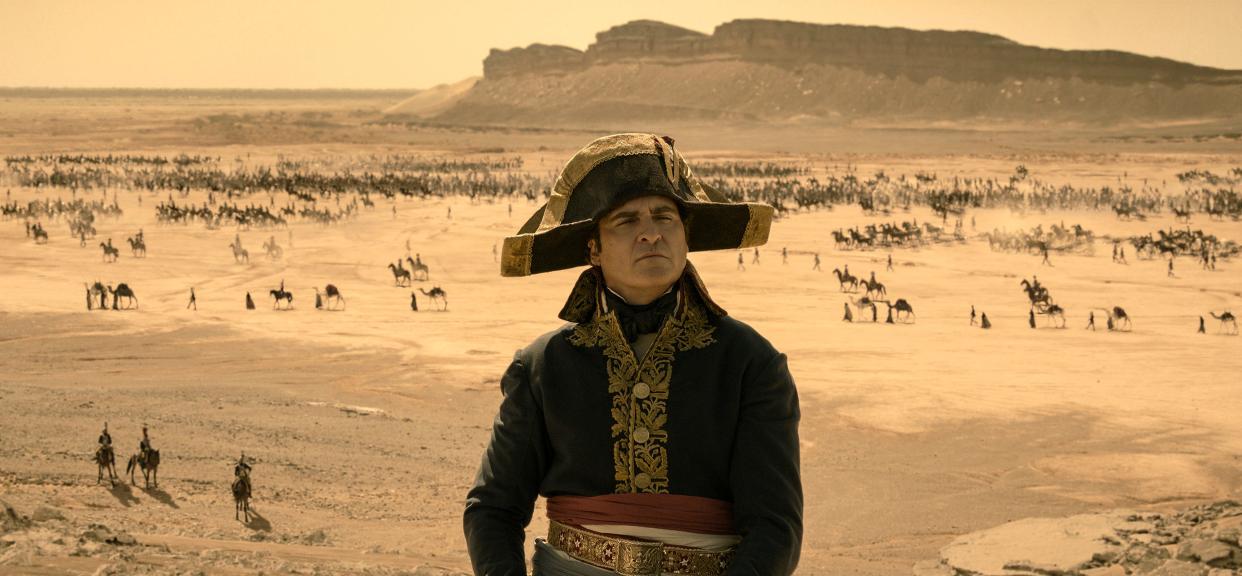'Napoleon' legend buckles under Joaquin Phoenix's uneven performance

Your reaction to the new Napoleon Bonaparte biopic will largely depend on your tolerance of the acting choices Joaquin Phoenix makes playing its lead.
As we have no footage or audio of the soldier-turned-emperor who conquered the world at the turn of the 19th century, it could be Napoleon is as Phoenix plays him. He mumbles, he pouts and appears uncertain.
This does not match the charismatic leader the film seeks to portray. A man who can persuade soldiers to drop their loyalty to flag and country and pledge allegiance to him. Would you betray your country for a guy who can barely get words over his lips?
No accent is adopted; which is fine, given Napoleon doesn’t speak French here. But there’s also no effort to blend into Ridley Scott’s grand production. Phoenix sticks out like a sore thumb in a movie seemingly built for him. The actor has made his reputation on such performances, but only works when the material matches up. Not the case here.
If it seems as though I am getting ahead of myself by focusing on Phoenix’s work, it’s because “Napoleon” is dependent on an actor who appears in almost every scene. There is much to admire about Scott’s sweeping epic otherwise.
As Bonaparte rises in rank within the anti-Royalist reign following the execution of Marie Antoinette, Scott and screenwriter David Scarpa link this ascendancy to his relationship with Empress Josephine (Vanessa Kirby). Despite successes on the battlefield and robust coups, Napoleon’s unanswered letters of love reveal a man willing to rule the world in order to gain an un-winnable heart in his wife. Of course, this also leads to self-destruction as well.
A provocative theory, and one that might unlock what Phoenix is trying to do. Perhaps he is portraying Napoleon how Empress Josephine sees him. That she sees the true man who cannot possibly live up to his legend. A good take, but doesn’t work with the rest of the film.
Scott certainly isn’t sympathetic to Napoleon — one character refers to him as “ill-mannered” — and Scott genuinely detests such characters, but does seek to show him as a unique, staggering historical figure. It’s a delicate balance, for sure. One that is more likely to fail than not. Sure enough.
One might ask if the film is historically accurate. I’ve not done the reading to properly answer. What I can attest is whether the situations and scenarios work thematically. Did Napoleon join his troops on the battlefield of Waterloo as the film portrays? Again, I fall back to Phoenix. The way the general is played, as a man who slouches through history, seems unlikely to do anything as brazenly reckless.
I understand the filmmakers want to dramatize Napoleon’s descent into madness and need a visual flourish. But does the audience buy it? I couldn’t. That’s just an example, but the film is full of others where Phoenix’s anachronistic portrayal doesn’t match the material.
Further, this might lead one to question whether the film holds up as a war picture. The battles and skirmishes are filmed in a clear, concise manner crackling with beautiful scenery and unspeakable gore. No one can manage chaos on screen quite like Scott, who proves as good of a director at 85 as he ever was.
But these scenes, intercut with those between Napoleon and Josephine, create an uneasy tone. Yes, the film seeks to connect the tumultuousness of this relationship to the carnage Napoleon leaves in his path. But, since Phoenix is the piece linking the story segments together, the contrast is shaky in ways not intended.
Odder still is how the film ends with a rendition of all the people killed at the major battles portrayed, as though there is a message about the horrors of war buried among the exquisite staging and Arthur Max’s immaculate production design. Francois Truffaut said there’s “no such thing as an anti-war film” because any depiction of war on film is going to be cinematic — and therefore somewhat appealing at some level.
The battles in “Napoleon” are indeed cinematic and make the coda disingenuous. If Scott was trying to make an anti-war film, he failed by making war look cool and gorgeous. You cannot have it both ways.
It is hard for me to be critical of a film that looks this good. Yet I cannot give “Napoleon” a pass because Phoenix is its center and the performance doesn’t work. A shame since Phoenix is one of our great actors and even gave one of my favorite performances of the year with “Beau is Afraid.” The staggering weirdness of that earlier film fit Phoenix’s performance. Here, it’s intractable.
This film wants to give Phoenix another crack at best actor, but the panicked mama’s boy we saw in “Beau” is the real showcase. With “Napoleon,” he comes up short. Sorry about the pun.
Given “Napoleon” comes out over Thanksgiving, it’s an easy choice to take dads and uncles to a war movie with grand production design and sweeping vistas.
But I would suggest giving “The Holdovers,” hiding out at Ragtag Cinema, a chance. It’s a bittersweet character story with some genuine insight into life, love and the complicated natures of relationships. While all the battles are internal, that’s the movie to catch this week while you’ve got a houseful of people who need some quiet time.
James Owen is the Tribune’s film columnist. In real life, he is a lawyer and executive director of energy policy group Renew Missouri. A graduate of Drury University and the University of Kansas, he created Filmsnobs.com, where he co-hosts a podcast. He enjoyed an extended stint as an on-air film critic for KY3, the NBC affiliate in Springfield, and now regularly guests on Columbia radio station KFRU.
This article originally appeared on Columbia Daily Tribune: 'Napoleon' legend buckles under Joaquin Phoenix's uneven performance
